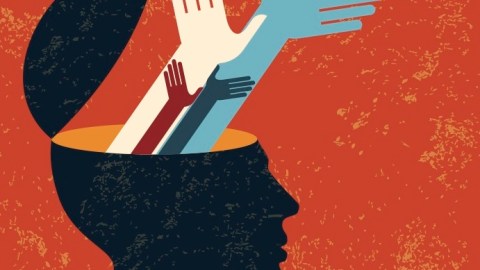We Can Learn from Those Who Hear Voices

This article originally appeared in the Newton blog on RealClearScience. You can read the original here.
“SHEIS leaving the room.”
Eleanor Longdon was a freshman in college the first time she heard it: the voice, as clear as day, calm and decisive. But that wasn’t the last time.
Over the following weeks she continued to hear it, harmlessly narrating everything she did. It was like having her own personal sportscaster, minus the haughty voice and occasional exclamations.
“It was neutral, impassive and even, after a while, strangely companionate and reassuring,” she recalled in August at TED2013. Sure, it would occasionally sound frustrated, but that was only when she herself was feeling exasperated or annoyed. In a way, her disembodied companion mirrored the parts of herself she kept hidden from the world, and that was comforting.
Everything changed, however, when she revealed the voice’s existence to a friend. So was set in motion a chain of events that almost destroyed her life: a visit to a psychiatrist, a hospital admission, a diagnosis of schizophrenia, a prescription of powerful antipsychotics, a stigmatization that would haunt and terrorize her for years.
Two years later, and the deterioration was dramatic. By now, I had the whole frenzied repertoire: terrifying voices, grotesque visions, bizarre, intractable delusions. My mental health status had been a catalyst for discrimination, verbal abuse, and physical and sexual assault, and I’d been told by my psychiatrist, “Eleanor, you’d be better off with cancer, because cancer is easier to cure than schizophrenia.” I’d been diagnosed, drugged and discarded, and was by now so tormented by the voices that I attempted to drill a hole in my head in order to get them out.
SOMEWHEREBETWEEN 3 and 10 percent of people hear voices that others don’t, and scientists still aren’t precisely sure as to why. According to Dr. Ben Alderson-Day, a researcher at Durham University and a member of the Hearing the Voice Project — a group aiming to better understand and explain the experience of hearing voices — many of the brain’s language centers become activated when voices are heard.
“What we don’t know yet is why they are active,” he told Metro Magazine. “One possibility is that the answer will be found in how these language centers are connected to other parts of the brain, such as the motor cortex and areas linked to long-term memory.”
We do know, however, that hearing voices is often triggered during prolonged bouts of stress, low self-esteem, or drug use. It may also stem from traumatic events in early life oroverwhelming fear or unexpected situations. When they appear, voices can sound corporeal as if someone is talking to you. They may also originate internally, but outside the bounds of one’s own control. Plainly different from personal thoughts, explains Dr. Anna Tickle, a clinical psychologist at the University of Nottingham who, along with her partner Dr. Lucy Holt, justcompleted a review exploring the experience of hearing voices from the hearer’s perspective.
“Voices were generally experienced by participants as coming from outside the self but manifested inside the body whereas thoughts were perceived as ‘belonging’ to the self,” she said.
According to Tickle and Holt, Western medicine has typically categorized hearing voices as meaningless, nothing more than a sinister symptom of mental illness. But in the last decade or so, that’s been changing.
“There has been increasing recognition of the importance of treating voices not just as a ‘symptom’ but as an experience with meaning,” Tickle told RCScience. “Although sadly some professionals are yet to catch up.”
To help them do so, Tickle and Holt sought to find and synthesize qualitative studies that explored subjects’ own experiences with hearing voices. They targeted research that showcased voice-hearers’ own thoughts and opinions, not just those of their psychiatrists.
They found that hearing voices is clearly not a homogenous experience. Some consider their aural companions to be positive, others pernicious. Almost all ascribe some sort of identity to their voices, whether by assigning a name or a gender. Voices were generally described as “powerful” and “invasive.”
OUT OF THEIR exploration, Holt and Tickle came up with a number of recommendations to help people deal with hearing voices without unwarranted, potentially damaging treatments. Interventions aimed at promoting the individual’s sense of self-worth and reducing their stress are key, as is putting them in touch with others who’ve experienced hearing voices and have learned to live harmoniously with them. Antipsychotics in moderate doses may also be of some use.
“For some, medication offers a vital component of recovery and can play a role such as ‘dampening’ distressing voices or just reducing anxiety,” Tickle told RCScience. “That said, such medications bring with them a barrage of side effects that can limit recovery, including diabetes, weight gain, lethargy, concentration difficulties, restless legs, muscle stiffness, facial tics, facial hair growth for women, hypersalivation… the list goes on and many of the difficulties have the potential to lead to further social exclusion and stigmatization.”
Overall, Tickle believes that hearing voices should be treated first and foremost with understanding.
“Within some non-Western cultures, voice hearing is valued and it would not be seen as indicative of any illness at all,” she said.
“As a psychologist, I am less interested in the label(s) somebody has been given and much more interested in their experience and the meaning they give it.”
IT WAS THIS sort of compassionate thinking that eventually liberated Eleanor Longdon. Pulling her up from the pits of her personal hell were empathetic survivors of schizophrenia, a mother who wouldn’t give up, and a doctor who instilled in her a sense that she could prevail over her own demons.
I used to say that these people saved me, but what I now know is they did something even more important in that they empowered me to save myself, and crucially, they helped me to understand something which I’d always suspected: that my voices were a meaningful response to traumatic life events, particularly childhood events, and as such were not my enemies but a source of insight into solvable emotional problems.
Source: Holt L, Tickle A. Exploring the experience of hearing voices from a first person perspective: A meta-ethnographic synthesis. Psychological Psychotherapy 2013 Nov 14. doi: 10.1111/papt.12017.
(Image: Shutterstock)




